capital punishment

Anyone who has spent even a second in a prison knows it’s hell. Growing up in church, I noticed people who participated in the church’s prison ministry were both respected and feared. Respected because they were doing what the writer of Hebrews admonishes believers to do regarding those in chains: Remember them as though you were in prison with them (13:3). But they were feared because many of them had actually been in prison. Rather than the prison system or the criminal legal system being classified as barbaric, it was the prisoners who were typically understood to be barbarians.
Joe Ingle has spent a lot of time in prison. Ingle is a writer and death row minister who has been active in prison ministry since the ’70s. A native of North Carolina and a graduate of Union Theological Seminary, Ingle has dedicated his life to being present with and advocating for the 1.9 million people incarcerated in the U.S., especially the more than 2,300 incarcerated people on death row.

While a number of anti-death penalty advocates rightly highlight the exonerations, Elizabeth Bruenig prefers writing about the “confessed and admittedly guilty … since we all already agree the innocent shouldn’t be put to death.”

Lawmakers in Virginia voted on Friday to abolish the death penalty. The Democratic-led House of Delegates voted 57-41 Friday, after the Senate passed the measure earlier this week. Gov. Ralph Northam, a Democrat, said he would sign the repeal into law.
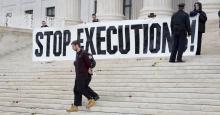
Today, 40-year-old Brandon Bernard is scheduled to be executed for a crime he was involved in at age 18. While Bernard was not the person who pulled the trigger on the two people murdered — that man, Christopher Vialva, was executed in September — he was eligible for capital punishment, which can only be handed down to legal adults.
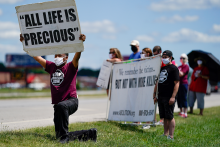
On July 14 the federal government executed Daniel Lewis Lee — the first federal execution in 17 years.
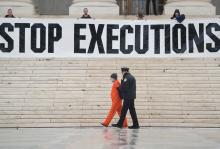
ON MARCH 13, California Gov. Gavin Newsom signed an order issuing a moratorium on the state’s death penalty—providing a reprieve from execution for 737 people on death row. Newsom cited as reasons that the ultimate penalty provides no public safety benefit and has no value as a deterrent. As someone who has worked as a public defender inside the criminal justice system for 30 years, I applaud the humanity and compassion of his decision.
While the number of countries that employ the death penalty dwindles, the United States and several others still enforce it. Despite strong empirical evidence to the contrary, we are led to believe capital punishment is reserved for the “worst of the worst” and that it is supported by victims and law enforcement alike. Leaving aside that 156 people on death row nationwide have been exonerated since 1973, the death penalty is discriminatory in its application and in the selection of those whom the state seeks to kill. It is largely sought because of the economic status of the defendant, the race of the victim and the defendant, and where the crime took place, not because of the circumstances of the offense.

The Roman Catholic Church formally changed its teaching on Thursday to declare the death penalty inadmissible whatever the circumstance, a move that is likely to be viewed askance in countries where capital punishment is legal.

What must it be like to survive your own execution?
It happened this week in Ohio. And it’s not the first time.

No one cared to get to know the man that they were killing — in Jesus’ case, and in the case of my friend. The judges and governor had made up their mind on who he was based on media headlines. No one saw any need to sit with the man who was on the execution table, to find out if his life had changed and whether or not he was having a positive influence on those around him. They defined him by a crime he had committed years ago.

More than 50 years later, California still lists lethal gas as a legal execution means. So do five other states: Arizona, Mississippi, Missouri, Oklahoma, and Wyoming, although Mississippi and Oklahoma, which use nitrogen hypoxia, don’t use that term. (More on that below). I learned this as I searched on my phone standing in front of John Singer Sargent’s monumental 1919 painting “Gassed,” which is on display in the New-York Historical Society’s exhibition “World War I Beyond the Trenches” (through Sept. 3).
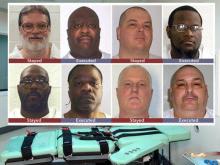
You might think these men were sentenced to death and slated for execution simply because of the gravity of their crimes. You’d be wrong.
There is something beyond the terrible crimes that determined their fates even more so: poverty. The death penalty preys on poor and vulnerable populations.

Arkansas carried out back-to-back executions on Monday night, administering lethal injections to two men convicted of rape and murder to become the first U.S. state to put more than one inmate to death on the same day in 17 years. Marcel Williams, 46, was pronounced dead at 10:33 CDT, a little more than three hours after the execution of 52-year-old Jack Jones, according to officials at Cummins Unit prison, about 75 miles southeast of the state capital, Little Rock.
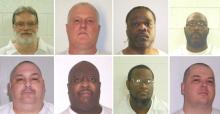
A U.S. judge in Little Rock on Saturday temporarily blocked plans by Arkansas to hold a rapid series of executions this month, after the inmates argued the state's rush to the death chamber was unconstitutional and reckless.

The last time a U.S. state tried to execute two inmates on the same day, a poorly secured intravenous tube popped out, lethal injection chemicals sprayed in the death chamber, and staff said the pressure of dual executions exposed flaws in the protocol. That scenario in 2014 in Oklahoma, where executions are now on hold, has not stopped Arkansas from pursuing an unprecedented plan to put eight inmates to death in back-to-back lethal injections on four days this month.

They removed all the black folks from the pool of potential jurors.
In the trial of a black man convicted of killing two white folks.
Not in 1950 ... but in 2002.

We march on Jan. 17 because it is the 40th anniversary of the first "modern-era" execution, after our courts ruled in favor of the death penalty following a decade-long moratorium. On that day, Gary Gilmore was executed by firing squad in Utah in revenge for his murders of Max Jenson and Ben Bushnell. Since then there have been 1,442 other executions. We will hold 40 signs, one for each year since 1977, with the names of those executed each year. We will also carry roses for the victims — both those who have been murdered and those who have been executed — declaring that violence is the disease … not the cure.

All over the nation, stress levels are in the stratosphere as the election season comes to its frantic conclusion. The choice for president feels like life and death to many of us, and may indeed affect our lives in profound ways. But certain votes will have a direct impact on whether others live or die. If you live in California, Nebraska, or Oklahoma, you have a chance to vote for life, human dignity, and redemption by rejecting the death penalty.
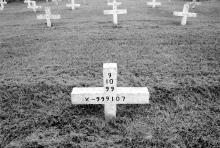
Since the reinstatement of the death penalty in 1976, Texas has had 537 executions — that’s over 400 more than any other state. But it has been more than five months since Texas has had an execution — 161 days to be exact. And that’s a record worthy of news. There’s only one other time in the past two decades that the death chamber has been that quiet in Texas.
But what’s happening in Texas reveals something deeper that’s happening all over the country. The death penalty is dying.

The human faces of the poor in Mississippi called to Paula and Margaret to love and serve. They responded and found the Divine. While they remained faithful to their Roman Catholic traditions and religious congregations, they needed the “other.” As Emmanuel Levinas, the French philosopher, has taught, “The Divine can only be accessed through the human other to whom the self is infinitely responsible.” With their advanced degrees, years of exceptional service and dedication, they could have gone anywhere. But they needed the people of Mississippi. And the people of Mississippi needed them. “The dimension of the divine opens forth from the human face."

In a letter signed by 49 evangelicals from Texas and around the country, the Christian leaders said officials have a “moral obligation” to stop the execution, which is scheduled for Aug. 24.